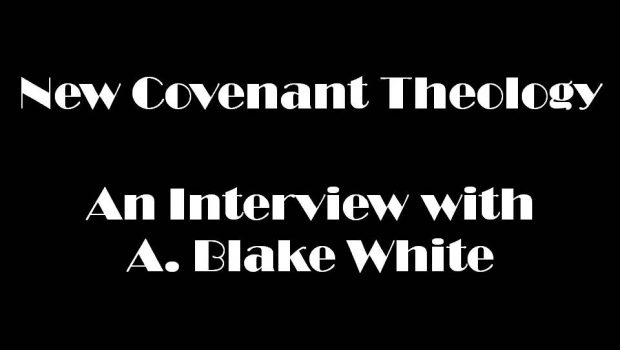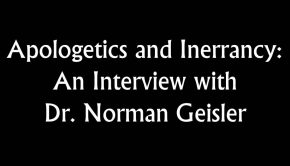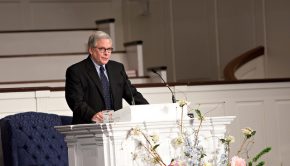What is New Covenant Theology? An Interview with A. Blake White
The following is the first of (hopefully) three interviews on Covenant Theology, New Covenant Theology, and Dispensationalism. I contacted Sound of Grace/New Covenant Media about doing an interview on New Covenant Theology, and they graciously agreed. What follows is a transcript of that interview, conducted via email, with A. Blake White. White is a contributor to Sound of Grace, and a leading advocate of New Covenant Theology, authoring such books as The Newness of the New Covenant, What Is New Covenant Theology?, and The Law of Christ: A Theological Proposal.
Questions asked by WV4G are bolded, White’s responses follow in regular text:
1. What is New Covenant Theology (NCT)?
New Covenant Theology (hereafter NCT) is a biblical-theological system that strives to use biblical language when possible, takes the progressive nature of revelation seriously, and sees the new covenant as the goal and climax of the previous biblical covenants. In What is New Covenant Theology, I have briefly mapped out seven essential points:
1. One Plan of God Centered in Jesus Christ
2. The Old Testament Should Be Interpreted in Light of the New Testament
3. The Old Covenant Was Temporary by Divine Design
4. The Law Is a Unit
5. Christians Are Not Under the Law of Moses, but the ‘Law’ of Christ
6 . All Members of the New Covenant Community Have the Holy Spirit
7. The Church Is the Eschatological Israel
If the reader is aware of the other two major systems of theology, they will see that some of these points fit within Covenant Theology (hereafter CT), while others fit more within Dispensational Theology (hereafter DT), but taken together, these make up a unique system of theology.
2. How does New Covenant Theology differ from Covenant Theology (CT)?
With so many different theologians, who bring their own nuances, it is hard to paint with a broad brush without mischaracterizing at least some, but generally speaking the main differences between NCT and CT are four:
First, CT sees more continuity across the canon than NCT does. With their theological category of “covenant of grace,” CT tends to flatten out the biblical covenants. Specifically, it tends to reduce the new covenant merely to a renewed covenant. When Jeremiah prophesied of a new covenant, he was explicitly clear: “This one will not be like the covenant I made with their ancestors when I took them by the hand to bring them out of the land of Egypt” (Jer 31:32 HCSB; cf. Ezek 16:61). The new covenant will not be like the old one. It will be different, radically so. CT is correct in seeing redemptive history structured around two covenants, but wrong in identifying them as the so-called “covenant of grace” and “covenant of works.” There is one plan of God centered in and on the Messiah, structured around two covenants – the old and the new. One pointing to Him, the other ratified by Him.
Second and related, NCT differs from CT’s view of the nature of the new covenant community. If the new covenant is different from the old covenant, so are the corresponding communities of those covenants. Again, Jeremiah 31 is clear; in the new covenant, no longer will a covenant member say to another covenant member “Know the Lord,” for every member of the covenant community will have circumcised hearts (Deut 30:6, Ezek 36:25-27). They will all know the Lord. In short, the new covenant community is a regenerate community, unlike Israel, who was a mixed community of the faithful remnant and the stiff-necked idolaters. Both the faithful and the idolatrous received the covenant sign. Building on the first difference, this is where Pentecost brings discontinuity. The permanent indwelling of the Holy Spirit in every member of the new covenant community is new. So in John we read, “Those who believed in Jesus were going to receive the Spirit, for the Spirit had not yet been received because Jesus had not yet been glorified” (John 7:39, cf 14:16-17, 16:7). Clearly, the Spirit had not yet been given before Pentecost. Israel’s experience of the Spirit was not the same as the church’s (Num 11:29, Joel 2:28-29, Isa 32:15, 44:3).
Third and related still, NCT differs from CT on the relationship between the church and Israel. It is not quite right to say that the church is Israel and Israel is the church. Scripture doesn’t make that straightforward, unmediated type of connection. The pattern is not Israel = Church, but Israel = Messiah = Church. Galatians 3:29 reads, “If you belong to Christ, then you are Abraham’s seed, heirs according to the promise.” There is an eschatological difference between Israel and the church. The new covenant is new. Again, this also has implications for the nature of the new covenant community. To be a part of this new covenant community, one must be united to Christ, the instrument of which is faith. If being in Christ, the singular seed of Abraham (Gal 3:16), is what constitutes membership in the end-time Israel, then faith is necessary – which infants cannot exercise. The church consists of believers only.
Fourth and finally, NCT differs from CT on the notion of law. “Reformed Baptists” would mostly agree on the previous three disagreements, but it is this issue that separates Reformed Baptists from New Covenant Theologians. The confessions where CT is found (viz. Westminster and the Second London of 1689), force CT to hold the Decalogue as God’s eternal moral law. NCT sees the Decalogue as part of the old covenant law, which Christians are no longer under. Since nine of the Ten Commandments are repeated in the New Testament, they pose no problem. The Sabbath, however, does. It seems to us that the New Testament is clear that Christians are no longer under the Sabbath and we see no exegetical warrant for changing the original commandment to make six days of work optional or changing it to Sunday. Rather, Hebrews 3-4 shows that the Sabbath has been fulfilled by rest in Christ (cf. Matt 11:28-12:8). In one of the most shocking passages in the New Testament, Paul said that to return to the Sabbath was to return to enslavement to paganism (Gal 4:8-10). He said the Sabbath was a shadow, but the body is Christ (Col 2:16-17) and even went so far as to say one should do whatever their own mind was convinced of (Rom 14:5), a far cry from Exodus 20:8 on any reading.
Those who seek to enforce the Sabbath on new covenant Christians would do well to heed Paul’s teaching and warnings on this very matter. His rebuke is sharp. In fairness, I do realize that most CT advocates are not seeking to enforce the Sabbath on Christians. In fact, most live life on the weekends just like I do. But it must be pointed out that this is inconsistent with their theology. For CT, the Sabbath, being one of the cherished Ten, is on the same moral level as adultery and murder, but when is the last time you heard of a church member being disciplined over breaking the Sabbath? NCT’s theological formulations are more consistent with CT’s practice on this point.
3. How does New Covenant Theology differ from Dispensational Theology (DT)?
NCT is further from DT than it is from CT. Though more could be said, the main differences are three-fold:
First, I think the fundamental difference between NCT and Dispensational Theology (DT) is hermeneutics. DT attempts to maintain a “literal” reading of the promises in the Old Testament. NCT seek more of a “literary” hermeneutic, allowing Jesus and His apostles teach us how to approach and interpret the Old Testament. NCT sees DT’s “literal” Old Testament hermeneutic as a failure to fully appreciate the progressive nature of Scripture. Sometimes DT accuses NCT of “spiritualizing” certain Old Testament promises, but NCT counters that it takes the Apostles “literally” when they literally “spiritualize” the Old Testament (e.g. Joel 2:28-32 in Acts 2:14-21 or Amos 9:11-12 in Acts 15:12-21 to name two of many). Literalism makes for a good slogan but is impossible to carry out consistently. NCT reads the Old in light of the New. This, of course, is anathema to DT and has some major theological implications.
Second, NCT denies DT’s sharp distinction between Israel and the church. This difference is particularly manifested in the church’s relationship to the new covenant. NCT sees the new covenant as for the church – those in Christ, the inaugurator of the new covenant. DT sees the new covenant for ethnic Israel in the future. NCT, like CT, rejects DT’s sharp distinction between Israel and the church. This is related to their view of the kingdom as wholly future, even positing that Jesus is not currently sitting on the Davidic throne.
Thankfully, DT has made adjustments. Largely due to George Eldon Ladd’s popularizing of inaugurated eschatology, academic theologians have in large part abandoned traditional DT. Now, many have adopted Progressive Dispensationalism. But according to Ryrie and many other traditional Dispensationalist theologians, Progressive Dispensationalism can no longer truly be called Dispensational (notice how Ryrie changed the title of his 1966 book Dispensationalism Today to Dispensationalism – implied now and forevermore – when it was revised in 2007). Progressive DT sees the church as sharing only in the spiritual aspects of Israel’s new covenant. So the church receives forgiveness of sins and the gift of the Holy Spirit, but the gist of the new covenant will not find fulfillment until the millennium with ethnic Israel.
Third, NCT differs with DT with regard to typology. Most of the differences between NCT and DT stand on the land promise. In the opinion of NCT, DT fails to see the typological nature of the land promise, which finds fulfillment by being “in Christ” rather than “in the land” now and will find ultimate fulfillment on a renovated earth at the resurrection (Rom 4:13, 8:18ff, Rev 21-22). The same goes for the typology of the temple.
4. Is New Covenant Theology a brand new innovation, or can it be found
throughout church history?
The label “NCT” is a relatively new innovation, but one can find as much exegetical evidence for this way of “putting the canon together” as one can find for CT or DT. I would actually argue more, though more work needs to be done. One neither finds the language of CT or DT in the Patristics, but one finds many similarities to NCT in their writing. Consider the way Irenaeus of Lyons and Justin Martyr spoke of the newness of the new covenant. Justin speaks of a “new law,” “the true spiritual Israel,” and even calls Jesus a “new lawgiver” (see chapter 11 of Dialogue with Trypho). The exegesis of the golden-mouth preacher, John Chrysostom, also lines up nicely with the key tenets of NCT (see his Galatians commentary, for instance). Moving right past the Middle Ages (as we all do; again, more work to be done), one finds much to glean from Martin Luther. Luther would often de-historicize “law” to merely refer to God’s demand, missing the redemptive-historical nature of the New Testament teaching on law, but many NCT folks will shout a hearty amen as they read through his How Christians Should Regard Moses (1525), as well as his work on Romans and Galatians. Doug Moo, who now identifies himself as NCT, previously referred to his view as a “modified Lutheran” view. One also finds the roots of the hermeneutic of NCT in the Evangelical Anabaptists. Long before his time, Pilgram Marpeck grasped the progressive nature of God’s revelation and referred to the old covenant as “yesterday” and the new covenant as “today.”
5. What is the broad Scriptural case for New Covenant Theology?
I would argue that NCT is the system that has the least amount of “problem passages” that do not fit within the system. Dispensationalism has trouble with the warp and woof of the New Testament. What I mean by this is that it is at odds with one of the central messages of the New Testament, namely the unity of Jews and Gentiles in Christ. The book of Acts, Ephesians, Romans, and Galatians come readily to mind. When DT wants to sharply distinguish Jews and Gentiles and the New Testament preaches another message, that’s problematic. I think CT has trouble with Galatians in particular, where there is a clear difference between the old covenant and the Abrahamic covenant (again, I do realize that some strands of CT are better than others here, e.g. Westminster West vis-à-vis Westminster East). They also struggle with the passages on the fulfillment of the Sabbath mentioned in question 2.
Constructively, NCT sees the promise of the obsolescence of the old covenant within the Old Testament itself. This is the argument of Hebrews. Notice how the author shows from the Old Testament itself that something new was needed (Ps 8, 95, 110, Jer 31). The argument of the sermon could be summarized as “Don’t go back. Jesus is better! Your own Scriptures pointed to Him!” A couple crucial passages are Hebrews 7:11-12 and chapter 8. The former explicitly says that the people received the law under the priesthood. Law and priesthood go together since the law is a unit (another key NCT tenet). The tripartite division of the law into moral, ceremonial, and civil is a product of Thomas Aquinas, not biblical exegesis. Then the preacher to the Hebrews says “For when there is a change in the priesthood, there must be a change of law as well” (I should add that the ESV botches this one, inexcusably translating gentives as datives). NCT is not making this stuff up. There was a change of law (contra CT). In the next chapter, the author includes the longest Old Testament quotation in the New Testament to say that the new covenant promised long ago has now been instituted. He applies Jeremiah’s promise to the church (contra DT). Second Corinthians 3 says much the same.
Another favorite letter for NCT is Galatians, our Katie Von Bora (let the reader understand). Here the Apostle is crystal clear about such things as the temporary nature of the law. It had a definite starting point (430 years after the promise to Abraham) and a definite ending point (when Messiah/faith came). The law functioned like a babysitter for Israel, but once adulthood has come, it is no longer needed. Galatians is also clear on the oneness of Jews and Gentiles in Jesus. “Those who have faith” – that is, the church – “are Abraham’s Sons” – that is, Israel (Gal 3:7). At the end of the letter, Paul summarizes his message. He lays out the rule of the new creation: neither circumcision nor uncircumcision matters. Then he wishes a blessing of peace and mercy on all who follow that rule: the Israel of God (Gal 6:15-16). Based on the context of the book, the Israel of God here is clearly all who find themselves in Christ by faith since “there is no Jew or Greek . . . . for you are all one in Christ Jesus” (Gal 3:28).
Another key passage for NCT is 1 Corinthians 9:20-21: “To the Jews I became like a Jew, to win Jews; to those under the law, like one under the law – though I myself am not under the law– to win those under the law. To those who are without that law, like one without the law– not being without God’s law but within Christ’s law – to win those without the law.” Here, Paul says that God’s law can no longer be equated with the Mosaic law. He is not under the old covenant law, but that does not mean he is autonomous. To be law-less is not to be lawless; to be without law is not to be an outlaw. No, he is under God’s law – in-lawed to Messiah.
So NCT strives to read Scripture on its own terms. Much more could be said, and since many passages have been pointed to, I hope one can get a feel for the exegetical foundation for NCT. For the curious-minded, books abound (for starters see Reisinger’s Abraham’s Four Seeds, Meyer’s End of the Law, Moo’s entry in Five Views on Law and Gospel, Wells and Zaspel’s New Covenant Theology, and Wellum and Gentry’s Kingdom Through Covenant).
6. How does New Covenant Theology view the Christian’s relationship to the
Old Testament Law?
Paul is crystal clear that believers are not under the law. By “law,” 98% of the time, Paul means Mosaic law-covenant. For him, and all 1st century Jews, the law was a package deal. A careful reading of Exodus 19-24 bears this out. The words of Exodus 20 and the ordinances of Exodus 21-23 constitute the book of the Covenant (Exod 24:3-7). One cannot extrapolate the commands from the covenant in which they were given. The old covenant and its law have been replaced by the new covenant. Paul is fond of making contrasting alternatives. Geerhardus Vos was right to say that these are part of the substructure of Paul’s theology. The various contrasts (law/Spirit, sin/righteousness, flesh/Spirit, death/life, etc) can be summed up under Adam and the Last Adam. Adam is the head of the old age. The last Adam is the head of the new age. In the equation of redemptive history, Paul lumps the law on the Adam side. This is why he begins the letter to the Galatians the way he does. Recall that the fundamental issue is false teachers trying to force Gentile Christians to obey the law. He begins by saying that Jesus has delivered us from the present evil age (Gal 1:4) and ends the letter mentioning the new creation (Gal 6:15). The Judaizers were confused about what time it was in redemptive history; their eschatological time-clocks were in need of fresh batteries.
This is also why Paul can say what he does in Romans 6:14. In context, Paul is teaching on our victory over sin through union with Christ. You would think he’d conclude the section with, “For sin will not rule over you, because you are not under sin but under grace.” But he doesn’t; he writes, “For sin will not rule over you, because you are not under law but under grace.” Remember that Paul has just fleshed out the representative natures of Adam and Christ a chapter earlier (Rom 5:12-21). For Paul, being under law is eschatologically old (see Jason Meyer’s book The End of the Law on this point).
In sum, one cannot improve on Paul’s words in Romans 7:4-6: “Therefore, my brothers, you also were put to death in relation to the law through the crucified body of the Messiah, so that you may belong to another to Him who was raised from the dead– that we may bear fruit for God. For when we were in the flesh, the sinful passions operated through the law in every part of us and bore fruit for death. But now we have been released from the law, since we have died to what held us, so that we may serve in the new way of the Spirit and not in the old letter of the law.”
I hasten to add that this does not entail that NCT is antinomian. There are some 2,000 imperatives in the New Testament and if anything, its moral vision is amped up – targeting the heart (see the antitheses of Jesus’ Sermon on the Mount). Christians are bound to the example of Christ, the teaching of Christ and His Apostles (supremely in the love command), and the Old Testament interpreted and applied in light of the new covenant. But centrally, new covenant Christians are commanded to walk and be led by the Spirit (Gal 5, 2 Cor 3).
7. What is New Covenant Theology’s view of the relationship of Israel to the
Church?
See Questions 2 and 3 above. In short, the church is the eschatological Israel by virtue of union with Israel’s Messiah. Jesus sums up Israel’s history, is the singular seed of Abraham, and all the promises of God find their yes in him (Gal 3:16, 2 Cor 1:20). Those in faith-union with Christ are co-heirs. The message of the New Testament is univocal on this point: “Those who have faith are Abraham’s sons” (Gal 3:7). There is no longer Jew or Gentile, but all are sons of God through faith since if you belong to Christ you are Abraham’s seed, heirs according to promise (Gal 3:26-29). Abraham is now the Father of all who believe (Rom 4:12, 16, cf. 1 Cor 10:1). Believers are those whose mother is the free woman, the Jerusalem above and it is they who are children of promise, like Isaac (Gal 4:21-31). The church is the community of the new creation, the new Israel, who follows the rule that ethnicity no longer matters (Gal 6:16). Gentiles were without the Messiah, but are now in Him by faith, included in the citizenship of Israel (Eph 2:11-12, 19). Jesus made Jews and Gentile one by tearing down the law in his flesh, creating in Himself one new humanity out of the two (Eph 2:14-15). The “circumcision” are believers – those who serve by the Spirit, boast in Christ, and put no confidence in the flesh (Phil 3:3). In the new covenant, a person is not a Jew by virtue of anything external, but internally by having their heart circumcised by the Spirit (Rom 2:28-29).
8. Dispensationalists are premillennial, Covenant Theologians are generally
amillennial or postmillennial. Does New Covenant Theology have a particular
eschatological commitment?
NCT does not entail or require a particular view of the millennium. It is unfortunate that people typically think immediately of the timing of the rapture and the millennium when one speaks of eschatology. There is so much more!! NCT focuses on the already of the already/not yet nature of the kingdom, the inaugurated aspects of eschatology. G.K. Beale and others are helpfully reminding us that the whole New Testament is eschatological, but in large measure it is eschatologically backward-looking more than forward-looking. That is to say, the eschatology of the New Testament is focused more on what the Messiah has already done than on what He was yet to do. NCT in no way downplays the yet-unfulfilled aspects of prophecy (e.g. resurrection, new earth), but wants to place the accent where the New Testament does. The first coming of Jesus is very significant for the fulfillment of Old Testament prophecy.
Having prefaced my answer with that, three of the four millennial views are compatible with NCT. One can be NCT and be historic premillennial, amillennial, or postmillennial with theological consistency (though many will be quick to assert that their view is the only consistent one!). Obviously Dispensational Premillennialism doesn’t have a seat at the NCT table since they have their own. One can have the exact same hermeneutic and biblical-theological outlook, but merely read Revelation 20 in different ways. In my experience, it seems that historic premillennialism and amillennialism are the most common millennial views of NCT.
9. Some people (such as Dr. R.C. Sproul) use the terms “Covenant Theology”
and “Reformed Theology” synonymously. Can New Covenant Theology maintain a
Reformed identity?
Hmmm. I am not sure that NCT has ever been concerned with maintaining a “Reformed identity.” Perhaps an “always Reforming” identity since we think the Protestant Reformers did not apply sola Scriptura robustly enough. I am sure I do not speak for all NCT advocates, but I agree with Sproul and many others (Horton, Clark, Hart, etc) who say that Reformed Theology is Covenant Theology (though many do not use the label in this way; see DeYoung’s recent blog (11/7/13) on the matter). Many early American NCT guys were unwelcome in the “Reformed” Baptist world. Many of them used “Sovereign Grace Baptist” to distinguish themselves from Reformed Baptists. I think Reformed folks are those who adhere to the Reformed Confessions and Reformed Baptists are those who adhere to the 1689 London Baptist Confession, which is built off of the Westminster Confession. Furthermore, since NCT does not bear directly on soteriology, I think an ardent Arminian could adhere to NCT, though I’ve never met one personally.
10. Speaking to someone who does not believe New Covenant Theology, what
would you give as the top three reasons to adopt it?
At the risk of coming off as arrogant, first I would say it is the only theology that can be derived from a plain reading of Scripture. One would be hard pressed to find a CT guy who came to his theological conclusions apart from reading books on Reformed Theology or Reformed confessions. Similarly, you will not find a Dispensationalist who came to DT without reading Scofield, Ryrie, MacArthur, or some other Bible “helps” from a DT perspective.
Second, one simply will not find theological categories such as “covenant of grace,” “covenant of works,” a Sabbath change from Saturday to Sunday, a pretribulation rapture, or many other DT and CT theological tenets from Scripture. In other words, NCT strives to use the language of Scripture in its theological formulation. We believe that theology ought to be grounded in the exegesis of the biblical text and in our opinion, NCT does this most consistently.
Third, I would say that NCT is the system of theology that is most consistently Christ-centered. All Evangelical theology strives to be Christ-centered, but in our opinion not all are consistent. As John Reisinger pointed out in Abraham’s Four Seeds (see 5, 36, 47, 53, 58, 94, 99, 100, 118), CT and DT ironically share the same hermeneutic on two different points: DT on the Abrahamic covenant and physical land; CT on the Abrahamic covenant and physical children. Neither consistently views these two issues with the Christotelic lenses Jesus Himself encouraged us to wear (Luke 24). DT fails to see that Christ wins the new creation – not merely a strip of land in the Middle East – for his people. The land is a type of the new earth. CT fails to see that the promise was to the mediatorial head and his seed, not the individual believer and their seed. Christ is the mediatorial head of the new covenant so the promise is for His seed, which is spiritual, not physical. Jesus has no grandchildren. The same could be said of the way Christ transforms the Sabbath and sums up Israel. NCT strives to practice a robustly Christ-centered hermeneutic in all biblical interpretation.










